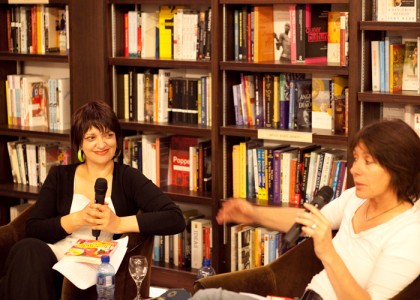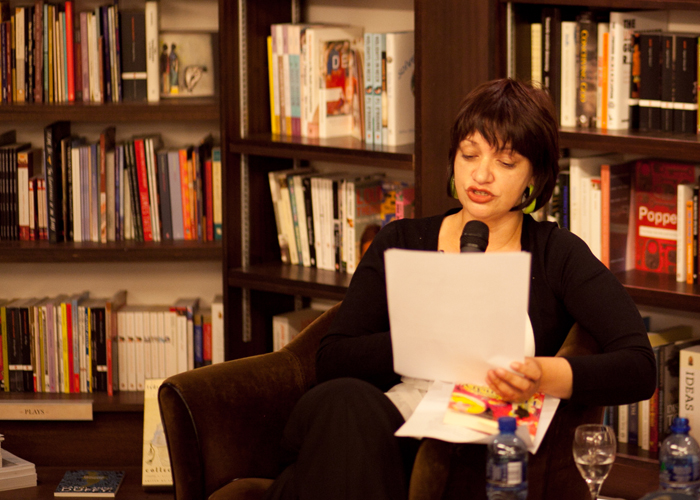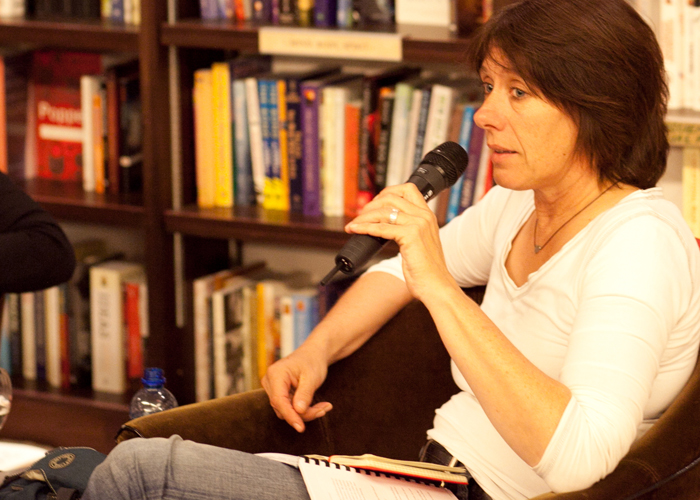Launch of Lessons in Husbandry by Shaida Kazie Ali, 12 April 2012, The Book Lounge, Cape Town.
KATE ELLIS-COLE

Shaida Kazie Ali and Marianne Thamm
“Women have always done men the favour of reading their work,” quotes the Master of Ceremonies at Cape Town’s Book Lounge, “but men have not often returned the favour.”
The gathered audience, which is predominantly female, but freckled with a handful of men, laugh easily at this drily frank sentiment, which has somehow come to preface the launch of Shaida Kazie Ali’s second novel, Lessons in Husbandry.
The elegant Kazie Ali sits, cozied up alongside journalistic legend Marianne Thamm, in an arrangement that closely resembles the set of a talk show. As the two women banter, their acerbic and sardonically wry humour invites the audience to relax into a voyeuristic observation of the discussion before them.
Before beginning the exchange, Thamm examines the “deliciously ambiguous” title of Lessons in Husbandry, pointing out that the term “husbandry” denotes not only marriage roles, but also the management of private matters. It is from this understanding that Thamm leads the interview through the detailed and intimate journey that is the plot, pausing to examine multiple absences in the narrative – absent individuals, the absence of truth between spouses, and absences of self.
Lessons in Husbandry is a fictionalised memoir, addressed by the protagonist, Malak, to her older sister who went missing when she was still in high school. As a result of her culture, Malak is obliged to marry her sister Amal’s fiancé in her stead. It is from a vantage point later in her life that the compliant but disillusioned narrator writes. As Kazie Ali herself points out, it was Malak’s sister who disappeared, but it is Malak whose life ended.
She and her sister’s husband live this placeholder life, until Malak meets a man who awakens her to the electricity of genuine attraction, and she begins to question the disparity of the law of the Qur’an in its application to men on the one hand, and women on the other. It is in this grey space that Kazie Ali’s questioning of interpretations of Islamic law has germinated the colourful, poignant and often brutally funny Lessons in Husbandry.
Kazie Ali admits that the agency that her protagonist finds is subversive: the idea that a woman may live out her desires is not one which finds favour with traditionalist Muslims. And yet Kazie Ali is emphatic on the point that the issues of equality and unequal application of the law are pertinent to all South African women – not just Muslims. Kazie Ali’s gripe is with the remnant mindset of patriarchy that seems to hang over social consciousness, emphasising that it is

Shaida Kazie Ali reads from Lessons in Husbandry
not religious teaching she finds fault with, but “patriarchal interpretations”. By writing her novel in the South African context, Kazie Ali invokes the equality clause implicit in the Bill of Rights, and highlights the loopholes in the law and in contemporary thinking surrounding issues of religion and gender. Thamm pronounces her faith in the novel as an enjoyable but important piece of writing that addresses the toxicity of patriarchy, and that will lend itself to a “crumbling of [patriarchy’s] remaining pillars”.
Malak, before falling in love with a man not betrothed to her sister, is a woman fighting for her identity in the soft, benign spaces of indifference, but finds creative liberty in a writing workshop; an instance that is inspired by the author’s own experience. It is here that Thamm again pauses in her interview, referring to the “communal process of writing” as being a feminine medium for producing fiction. Thamm questions Kazie Ali’s writing process, to which Kazie Ali responds: “I get irritated when authors say the book wrote itself, but this [was a story] that I knew from the beginning,” acknowledging the teaching and inspiration of Ann Schuster.
While the Muslim Shaida Kazie Ali and the “recovering Catholic” Marianne Thamm speak freely and comfortably, chatting as women do, pausing even to dig in handbags and bemoan their petulant children, it is easy to see how humour and honesty work to bridge gaps, while hegemony and oppression drive people apart. Lessons in Husbandry is a women’s novel that does not hate, nor exclude, men, but insists on equality for men and women. It is a novel that celebrates sex, love and human connection, and decries the chasms that still exist between people, a novel that promises to be good fun, and truly compelling.

Marianne Thamm
 SLiPStellenbosch Literary Project
SLiPStellenbosch Literary Project